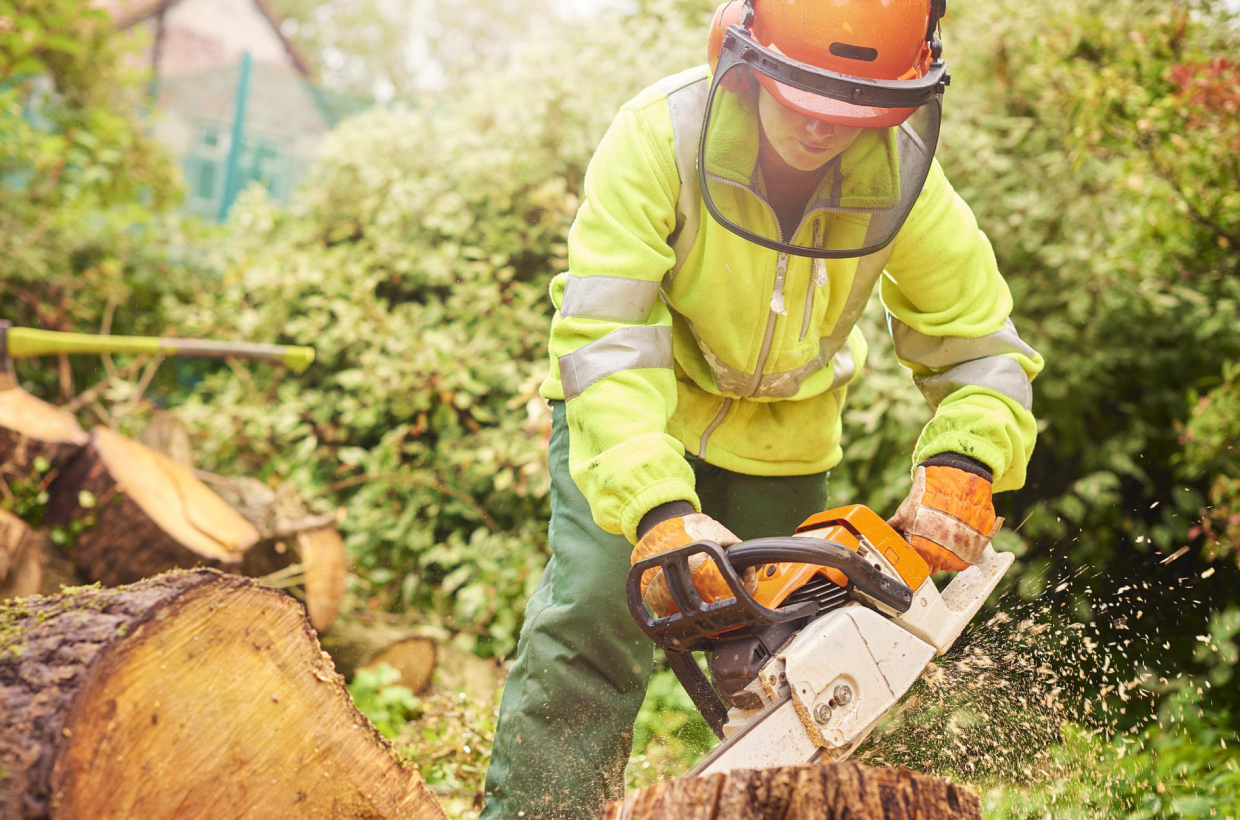
Tree Officers manage trees to maintain and improve the amenity, environmental and wildlife benefits of the tree population. They mostly work for local authorities or their contractor, and protect trees from development, pests and diseases and mismanagement.
Tree Officers can also be responsible for managing new planting projects and overseeing tree maintenance activities carried out by Tree Surgeons.
Also known as: Tree Preservation Officer, Arboricultural Officer
You'll need:
knowledge of trees and shrubs, including growth, nutrition, pests and diseases
up-to-date knowledge of local and national legislation and guidance including tree preservation orders and health and safety
physical skills like movement and co-ordination, and a reasonable level of fitness
to be thorough and pay attention to detail
good communication skills and be able to work well with others
knowledge of public safety and security
patience and the ability to remain calm in stressful situations
to be able to carry out tasks on a computer or hand-held device, including GIS programmes, tree management software and diagnostic equipment
to prepare documents and reports for a range of stakeholders
35-40 hours per week. This job may require you to be a call-out rota to handle tree emergencies out of hours and to work some evenings, weekends and bank holidays.
Inspect trees, either on a routine basis or as the result of requests
Carry out tree surveys and monitor tree numbers, recording all data
Advise on tree protection and preservation orders in planning applications
Manage trees in parks, on housing estates and at the roadside
Respond to enquiries regarding dangerous trees, unauthorised works to trees, trees blocking the light, or fallen trees
Organise tree planting schemes
Supervise tree care and tree planting contracts on site
Give talks on arboriculture to schools and other groups
Assess tree damage after storms
Provide expert witness testimony at planning enquiries and court hearings
You could work in woodland, in parks and gardens or on the streets outdoors in all weathers.
Analysing data and writing reports will take place in an office.
Training is an essential part of any job, giving you the skills and knowledge you need to do your job safely and correctly. It also helps to strengthen your current skill set and prepares you for the next stage in your career.
Apprenticeships help you build the experience and skills that employers want to see. No matter what stage you’re at, they’ll help set you up for a bright future. There are lots of ways to get involved.
You could manage a team of Tree Officers and co-ordinate work with outside contractors.
You could also work as a consultant, advising organisations on tree management, conservation and safety.
You could also find teaching opportunities with training providers who offer courses in arboriculture.
Tree Officer will usually work in one of the following industries. Click below to find out more about possible career paths.
Trees don’t only bring pleasure to millions of us – they provide a broad range of career options to help manage habitats and fight climate change.
Woodlands and forests enhance and support our lives. Trees absorb and store carbon dioxide, provide wood, moderate climate, help regulate our supply of fresh water, prevent erosion and flooding, provide a wide range of habitats for people and wildlife, and bring huge pleasure and wellbeing to millions.
Forestry and timber also play a major role in developing a low carbon economy: planting new trees offsets emissions and helps lock-up carbon in construction. Each nation has their own tree-planting strategy and target to help achieve their net zero goals.
Careers tend to split into two main areas. Forestry is the science and practice of planting, managing and harvesting forests for wood and timber, while arboriculture involves cultivating and managing trees in urban environments, like parks, community spaces and private properties. While there’s some overlap in skills, foresters tend to manage forests and timber on a larger scale while arborists look after trees in smaller green spaces. Both options offer diverse, challenging career opportunities.
The area of woodland in the United Kingdom is estimated to be 3.2 million hectares
The UK has a tree-planting target of 30,000 hectares a year by 2024 – the equivalent of at least 90 million trees
69% of the UK population visited woodland in 2021
In the Republic of Ireland, the area of forest is estimated to be 770,020 ha or 11% of the total land area of Ireland - over 50% of this is in public ownership, mainly through Coillte
These courses are perfect if you are starting out on your career but they are also great for people already in jobs who want to improve their skills.
To find out more about qualification levels in England please visit Regulated Qualifications Framework (RQF) for England and Northern Ireland or Framework for Higher Education Qualifications for England, Wales and Northern Ireland (FHEQ) .
To find out more about qualification levels in Northern Ireland please visit Regulated Qualifications Framework (RQF) for England and Northern Ireland or Framework for Higher Education Qualifications for England, Wales and Northern Ireland (FHEQ).
To find out more about qualification levels in the Republic of Ireland, please visit National Framework of Qualifications for Ireland (NFQIE)
To find out more about qualification levels in Scotland please visit Scottish Credit and Qualifications Framework (SCQF).
To find out more about qualification levels in Wales please visit Credit and Qualifications Framework for Wales (CQFW) or Framework for Higher Education Qualifications for England, Wales and Northern Ireland (FHEQ).
| Title | Level |
|---|
These courses are perfect if you are starting out on your career but they are also great for people already in jobs who want to improve their skills.
Whether you’re just starting out in the workplace, want to upskill or are considering changing direction, Apprenticeships are a fantastic way to build your career. Apprenticeships combine work with on-the-job training, so if you want to earn as you learn, there’s an apprenticeship out there for you – you can even start an apprenticeship if you already have a degree.
Work, earn and learn – no matter where you are in your career, an apprenticeship can set you up for a bright future.
Let’s get started!
Want to take on an apprentice? Employers start here.
An apprenticeship is a unique blend of work experience and study to help build the skills and knowledge you need for your career. Apprentices are employees – they have a contract, are paid and get the same benefits as everyone else. But the difference between an apprenticeship and a normal job is that apprentices are regularly released from work for training. Sometimes that’s a day a week, sometimes it’s for a longer block – it all depends on the job and the apprenticeship.
Apprentices work for all kinds of people at all kinds of stages in their lives. Most apprentices fall into one of three categories:
Previously restricted to school leavers and young people, apprenticeships are now a dynamic way of retraining people of all ages - there’s no upper age limit. The minimum age to become an apprentice is 16 and candidates can’t be in full-time education.
Apprenticeships offer a unique combination of paid work and study. They’re an exciting option for anyone who wants to gain experience, upskill or change career while working.
They offer a chance to work, learn and earn:


Interested in becoming an apprentice? Search for current opportunities and apply here.
Find your apprenticeship
You can also check vacancies on employer websites or get in touch with your local careers service.
What’s it like to work, earn and learn? Find out what apprentice life is really like.
Explore apprenticeship stories
Arboricultural Association
Find out more
The Institute of Chartered Foresters
Find out more
Confederation of Forest Industries (Confor)
Find out more
Royal Forestry Society
Find out more
Woodland Trust
Find out more
Forestry and Land Scotland
Find out more
Scottish Forestry
Find out more
Forestry England
Find out more
Forestry Commission
Find out more
Natural Resources Wales
Find out more
Thinking about your finances is important when you're looking at courses and training - different types of funding support is available depending on what type of course you're interested in and where you are located. We recommend you contact the training provider for more information on course costs and financing, but here are some links to connect you to support available:
Skills Hub Scotland is an online skill sharing marketplace creating new opportunities to learn and share skills. Wherever you are located - if you have a skill to share, or a skill to learn, Skills Hub Scotland can help.
Initially founded as a response to the Scottish Government’s CivTech 5 programme in 2020 and aiming to offer a platform for those in rural or remote locations, Skills Hub Scotland has been developed into an important sectoral resource. If you have a skill to share with others or are a training provider, list your workshop or course (all skills from all sectors are welcome). If you are a learner, use Skills Hub Scotland to search for and book a course!
STEM is an approach to learning and development that incorporates the areas of science, technology, engineering and mathematics. Learning in STEM connects to Education for Sustainable Development/Learning for Sustainability and the Sustainable Development Goals – this helps learners to understand that STEM plays a vital role in finding solutions to real world issues or challenges such as protecting biodiversity and tackling climate change. There are multiple pathways into a land-based STEM career including apprenticeships, further and higher education. This means that a career in STEM is open to everyone!
STEM Learning is the largest provider of STEM education and careers support in the UK. Their STEM Ambassadors programme sees volunteers representing a vast range of STEM-related jobs work with young people to bring STEM subjects alive through real life experiences. They help to open the doors to a world of opportunities and possibilities which come from pursuing STEM subjects and careers. To become a STEM Ambassador, you can register via the STEM Learning website: https://www.stem.org.uk/stem-ambassadors/join-stem-ambassador-programme
Lantra have worked in collaboration with STEM Ambassadors in Scotland to create two specific UK-wide Ambassadors schemes - Forestry and Aquaculture. Through these schemes, we want to make sure that those working in forestry and aquaculture have the support materials they need to take part in STEM activities. To find out more and register for the schemes, please follow the links below:
Smart Futures helps young people in Ireland discover the STEM subjects and careers that might be right for them. Co-ordinated and managed by Science Foundation Ireland, their programme allows young people to connect with people that are working in STEM, the organisations they’re working in and what their interests and skills are.
Why not take a look at the Industries Explorer as an introduction to the different areas you could work in.
If we can support you with any specific information, please click the button below to get in touch.